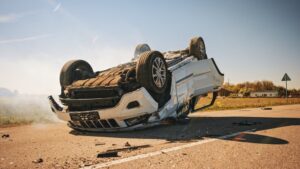Speeding is a Factor in Almost 30 Percent of all Fatal Accidents
Speeding is a Factor in Almost 30 Percent of all Fatal Accidents
When other drivers regularly violate speed limit laws, they increase their chances of causing serious accidents and injuries – some of which may be fatal. Drivers who speed are less likely to maintain control of their vehicles and respond to emergency situations, such as abrupt traffic back-ups.
If you lost a loved one in a motor vehicle crash that resulted from a speeding driver, you need to speak with experienced legal counsel right away about your options. An experienced car accident attorney in your area can determine your eligibility for filing a wrongful death claim and take the necessary legal steps on your behalf. Through aggressive settlement negotiations or litigation, your attorney will pursue the monetary compensation you and your family members need to obtain the justice and closure you deserve.
Schedule a Free Initial Consultation
How Does Speeding Lead to a Fatal Car Crash?
Speeding is a significant contributing factor to fatal car accidents, amplifying the severity of collisions and diminishing the likelihood of survival for those involved. Several key reasons underscore the serious consequences of excessive speeding on area roads.
First, higher speeds reduce a driver’s reaction time, making it challenging for them to respond promptly to unexpected obstacles, changes in traffic patterns, or the actions of other drivers. In situations where split-second decisions are crucial, the delay caused by speeding can have devastating consequences, often leading to fatal accidents.
Excessive speed also extends the distance required to bring a vehicle to a stop. A speeding car covers more ground during the driver’s reaction time and braking process, increasing the likelihood of collisions – especially when sudden stops are necessary. This amplified stopping distance becomes a critical factor in fatal accidents, particularly at intersections or in scenarios with heavy traffic.
Moreover, high speeds escalate the force of impact in a collision. The kinetic energy generated by a fast-moving vehicle dramatically intensifies the damage inflicted on vehicles and occupants. When a collision occurs at high speeds, the likelihood of severe injuries or fatalities rises significantly.
 Speeding also hampers the effectiveness of safety features and protective devices within vehicles. Seat belts, airbags, and other safety mechanisms are supposed to provide optimal protection at moderate speeds. However, when a vehicle is speeding, these safety features may not adequately mitigate the impact forces, leading to more severe injuries or fatalities upon impact.
Speeding also hampers the effectiveness of safety features and protective devices within vehicles. Seat belts, airbags, and other safety mechanisms are supposed to provide optimal protection at moderate speeds. However, when a vehicle is speeding, these safety features may not adequately mitigate the impact forces, leading to more severe injuries or fatalities upon impact.
Furthermore, speeding increases a driver’s likelihood of losing control of their vehicle, especially in adverse weather conditions or on challenging road surfaces. Vehicles traveling at excessive speeds are more prone to hydroplaning, skidding, or veering off the road, escalating the risk of fatal accidents.
Speeding remains a major catalyst for fatal car accidents due to its impact on reaction time, stopping distance, collision force, effectiveness of safety features, and overall vehicle control. If you lost a loved one in a motor vehicle accident that a speeding driver caused, a wrongful death lawyer can investigate the accident circumstances and determine your eligibility for filing a wrongful death claim seeking various monetary damages.
Types of Fatal Car Crashes that Frequently Result from Excessive Speeding
Excessive speeding significantly heightens the risk of fatal car accidents, leading to severe consequences for drivers, passengers, and others on the road. Several common types of fatal accidents associated with speeding include the following:
- High-speed traffic collisions – One of the most prevalent fatal accidents resulting from excessive speeding is high-speed traffic collisions. When vehicles travel at speeds significantly above the posted limits, the force of impact in a collision becomes significantly greater. High-speed crashes often lead to catastrophic injuries and fatalities, especially on local highways and expressways.
- Pedestrian and cyclist accidents – Excessive speeding seriously threatens pedestrians and cyclists (including motorcyclists and bicyclists). Higher speeds reduce the time for drivers to react to the presence of pedestrians or cyclists in their path. When a collision occurs at elevated speeds, the chances of fatal injuries to vulnerable individuals increase significantly.
- Single-vehicle crashes – Speeding is also a common factor in single-vehicle crashes, where a vehicle leaves the roadway and collides with obstacles like trees, utility poles, or barriers. The force of impact in these incidents can lead to fatal injuries for the driver and any passengers in the vehicle.
- Failure to negotiate curves – Excessive speeding frequently impairs a driver’s ability to navigate sharp curves safely. Failing to reduce speed while approaching sharp curves can result in vehicles crossing into oncoming lanes or leaving the road, leading to fatal crashes.
- Intersection collisions – Speeding through intersections is a leading cause of fatal accidents. When drivers fail to adhere to posted speed limits at busy traffic intersections, they compromise their ability to react quickly to traffic signals and other vehicles. This can result in T-bone or side-impact collisions, which are known for their heightened risk of fatalities.
- Loss-of-control accidents – Speeding significantly reduces a driver’s ability to safely control their vehicle, especially in poor weather or slippery surfaces. Loss-of-control accidents, where a driver skids, spins, or veers off the road, can result in fatal outcomes for other drivers and their passengers due to the increased likelihood of collisions or rollovers.
- Head-on traffic accidents – A head-on collision happens when the fronts of two vehicles strike one another while moving in opposite directions. High speeds amplify the severity of head-on collisions, making them particularly deadly. This is especially true when both vehicles are traveling at high rates of speed.
- Car and truck rollover accidents – Excessive speeding, particularly around curves or on uneven surfaces, increases the likelihood of rollover accidents. Vehicles traveling at high speeds are more susceptible to tipping over (fully or partially), often causing severe injuries or fatalities to vehicle occupants. Rollover accidents are particularly dangerous as they can involve multiple impacts and multi-vehicle pile-ups, further escalating the potential for harm.
If you lost a loved one in one of these types of traffic accidents that a negligent driver caused, a knowledgeable wrongful death attorney can explain your legal rights, review potential options with you, and handle your wrongful death case from start to finish.
How to Prove the Legal Elements of a Fatal Car Accident Case
Proving a fatal car accident claim or lawsuit involves navigating complex legal processes and gathering compelling evidence to establish liability. While the emotional toll of such cases is immense, focusing on the legal aspects is crucial for seeking the justice and monetary compensation you and other surviving family members deserve. Some of the key steps to legally proving a fatal car accident claim include:
- Gathering evidence – It is important to collect evidence after a fatal car accident as soon as possible, including photographs of the accident scene and witness contact information when possible.
- Obtaining vehicle data and black box information – Modern vehicles often have event data recorders, commonly known as black boxes, which capture crucial information about a vehicle’s speed, braking, and other performance metrics leading to a fatal accident. Retrieving and analyzing this data can provide objective insights into the events preceding the crash and what may have happened during the crash.
- Retaining expert witnesses – Engaging expert witnesses, such as accident reconstruction specialists or medical professionals, can significantly strengthen a fatal car accident claim. These experts can provide in-depth analyses of the accident dynamics or the extent of injuries, offering a professional opinion that significantly bolsters the case.
- Determining if traffic violations occurred – If the at-fault driver received a citation from a police officer for traffic violations, such as speeding or running a red light, these citations may serve as strong evidence of negligence. Traffic violations can establish a breach of duty that contributed to the fatal car accident.
- Obtaining a driver’s telephone records – An at-fault driver’s phone records may reveal whether the driver was using their cellular phone at the time of the collision, serving as evidence of negligence.
- Obtaining testimony from eyewitnesses – Eyewitness testimony can provide valuable perspectives on how the fatal car accident occurred. Their accounts can be instrumental in establishing the facts surrounding the collision – especially if the at-fault driver or their insurance company is disputing fault.
- Obtaining autopsy and medical records – In fatal car accidents, post-mortem examinations or autopsies may ultimately determine the cause of death. These records, along with medical records leading up to the accident, serve as important evidence linking the fatal injuries to the car accident.
- Preserving physical evidence – Retaining and preserving physical evidence in the case, such as damaged vehicles, debris, and personal belongings, can be crucial in recreating the sequence of events and supporting lawsuit claims.
- Obtaining a copy of the police report – A police report is a vital document in any fatal car accident claim. Law enforcement officers conduct investigations, record statements, and assess the scene to compile an official report. Obtaining a copy of this report is crucial for documenting the circumstances and determining how the accident occurred and who was at fault.
- Documenting survivors’ emotional losses – In a fatal car accident claim, it’s essential to document the emotional impact on surviving family members and the losses they have suffered. This includes the loss of the decedent’s companionship and financial support, as well as the emotional trauma survivors experienced as a result of the accident.
Seeking legal counsel from an experienced wrongful death lawyer is essential after a fatal car accident. A skilled attorney can guide you through the legal process, ensure proper evidence collection, and use their experience to build a strong and compelling fatal car accident claim or lawsuit.
Proving a fatal car accident claim is challenging, but with thorough documentation, support from experts in their respective fields, and legal representation, it becomes possible to establish liability and seek the compensation necessary for you and your surviving family members to move forward.
Recovering Monetary Compensation in a Wrongful Death Claim
In a fatal car accident case, monetary damages are necessary to compensate surviving family members for the losses they incurred due to their loved one’s untimely death. Some common types of monetary compensation that a wrongful death claimant may be eligible to recover in a claim or lawsuit include:

- Wrongful death damages – Wrongful death damages are specifically designed to compensate surviving family members for the loss of their deceased loved one. These damages include compensation for burial and funeral expenses and aim to alleviate the financial strain of end-of-life arrangements.
- Pain and suffering – Pain and suffering damages are recoverable for the physical and emotional distress that the decedent experienced up until the time of their death.
- Lost earnings and loss of future earning capacity – When family members were dependent upon the decedent’s income for survival, they can claim loss of the decedent’s current and future earnings to provide them with the necessary compensation to stay afloat.
- Loss of companionship and consortium – Loss of companionship and consortium damages address the intangible losses that surviving family members suffer due to their loved one’s untimely death. These damages include the loss of their loved one’s guidance, companionship, care, and emotional support.
- Medical expenses – Even if the car crash victim did not survive their accident, any medical expenses they incurred before their death are recoverable. These damages include the cost of emergency medical care, hospitalization, and other medical treatment related to the injuries they suffered in the car accident.
- Punitive damages – In some instances, punitive damages may be available if the at-fault party’s conduct was grossly negligent or intentionally harmful. The ultimate purpose of punitive damages is to punish the at-fault driver and discourage similar conduct in the future.
- Reasonable legal fees – Reasonable legal expenses incurred in pursuing the wrongful death claim, including attorney fees and court costs, may also be recoverable as part of a claimant’s wrongful death damages.
Successfully recovering these types of monetary damages in a fatal car accident case requires thorough documentation, expert assessments, and legal experience. Consulting with an experienced wrongful death attorney in your area is crucial to navigating the complexities of these claims and ensuring that you and other surviving family members receive fair monetary compensation for your losses.
Speak with a Knowledgeable Wrongful Death Attorney Near You Today

Greg Bentley, Car Accident Lawyer
Losing a loved one is never easy – especially in a fully preventable fatal car accident. If you lost a loved one in a car crash that a negligent driver caused, a skilled personal injury attorney can handle the legal components of your case while you mourn the loss of your loved one. Your attorney can file a wrongful death claim on your behalf, negotiate with insurance company adjusters, and, if necessary, litigate your case to a resolution in the state court system.


